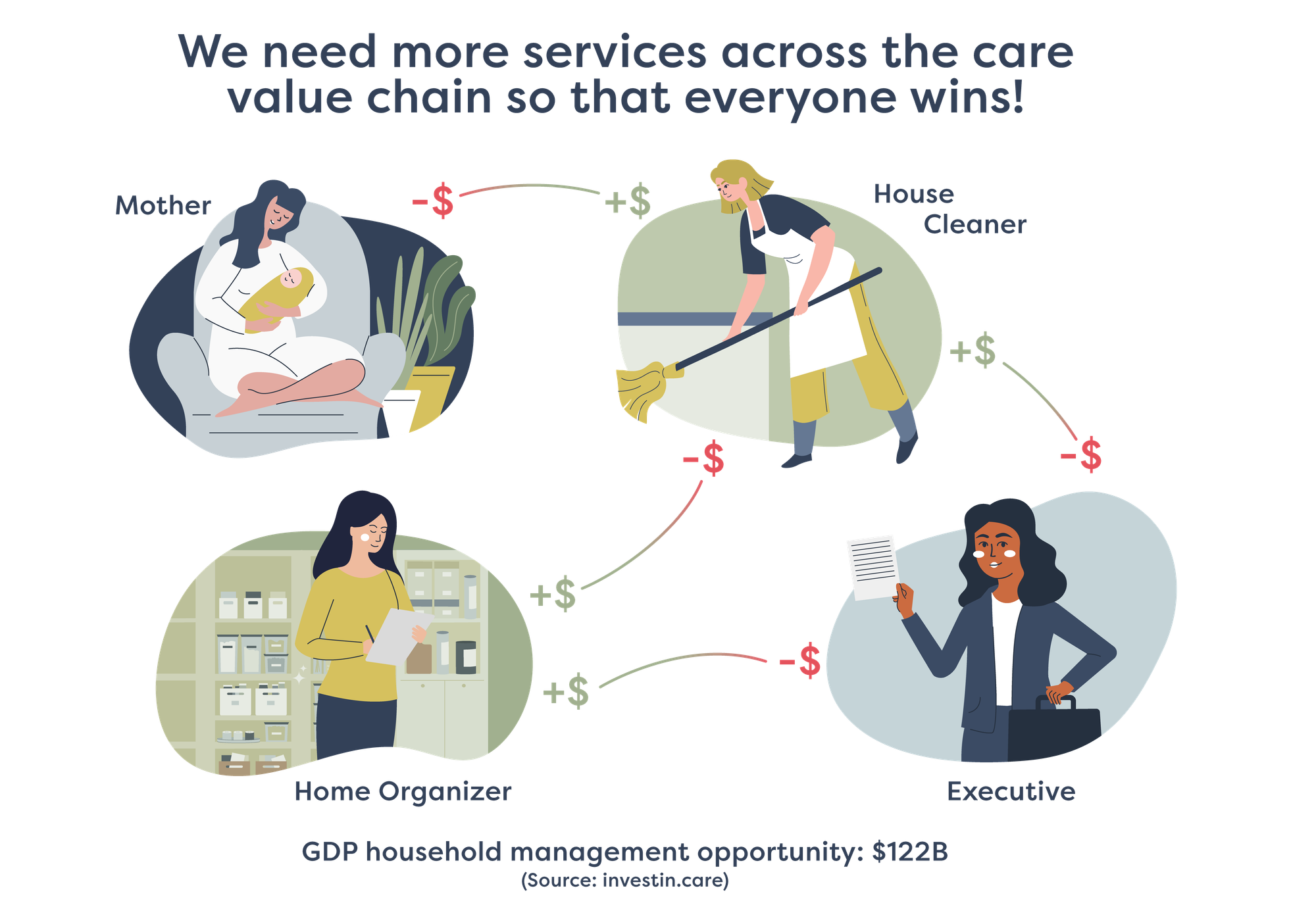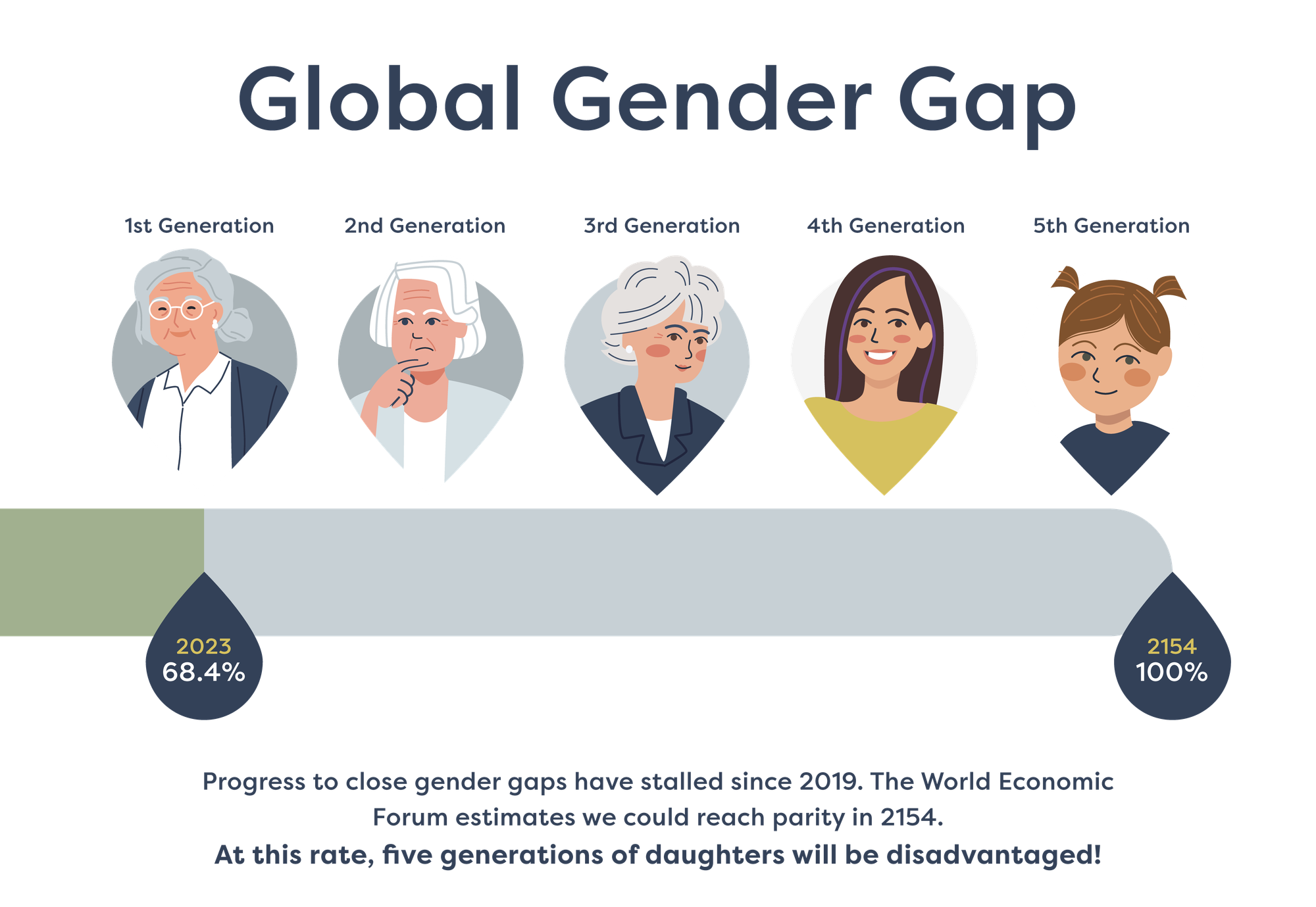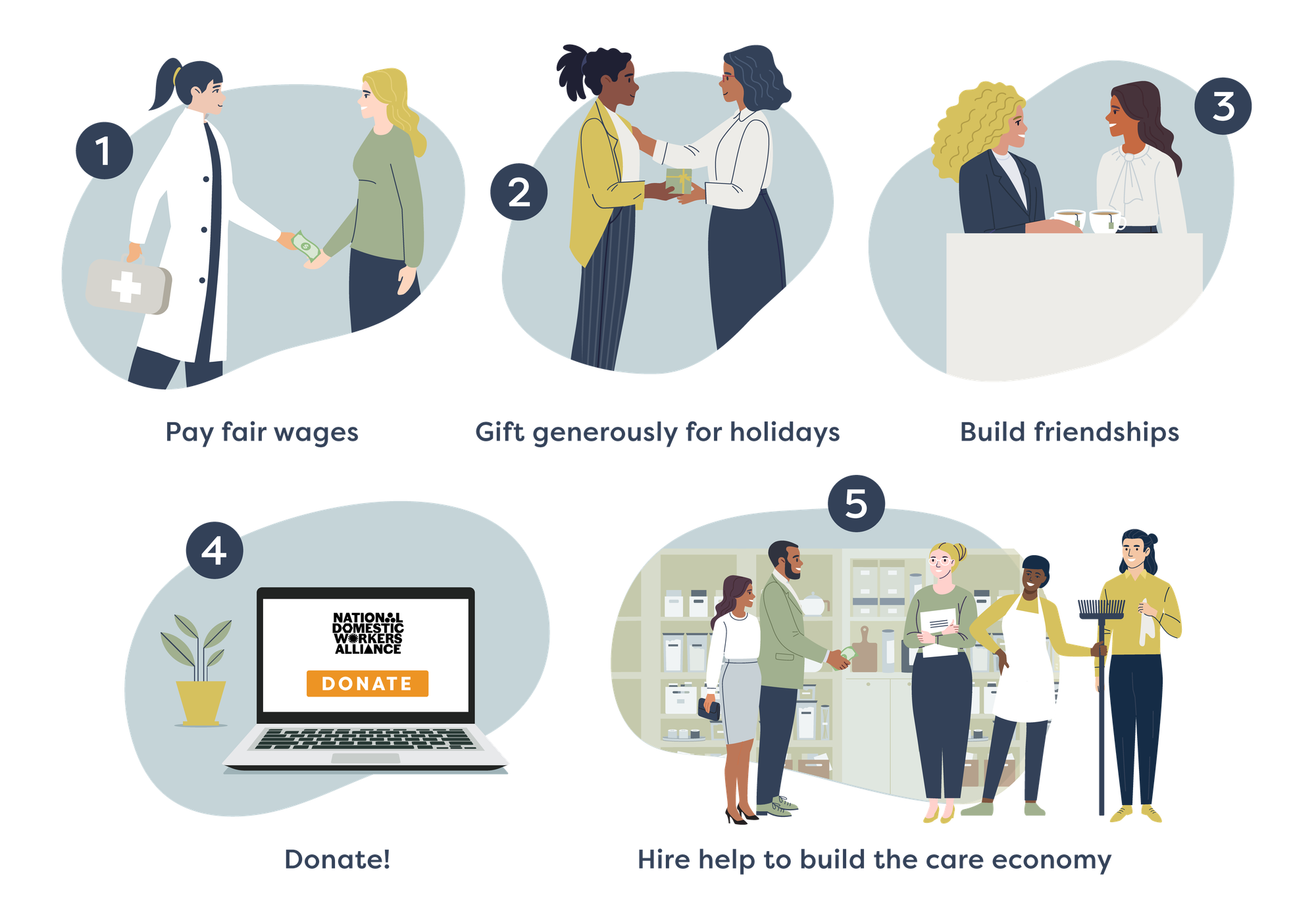Making a Movement to Revalue Care

Until we value domestic labor, women with children will not achieve equitable social outcomes at work or at home.
Wage gaps, wealth gaps, and work gaps cannot close until men and women, and especially individuals and corporations in positions of capital supremacy, invest in real self-care for mothers, caretakers, domestic laborers, and female executives.

We’re all in the economic value chain together. Now is a great time to invest in women. (Read to the end for actions you can take today.)
Domestic labor is more than cleaning floors, doing laundry, and stocking the fridge: it’s the foundation that powers our economy and makes all other work possible. Trying to build systems of social equity without addressing and valuing how work is done at home is like building a house without setting the footings; it’s only a matter of time before cracks in the walls, uneven floors, and collapse follow. The work to care for families and communities is analogous to the footings of a house. Care work upholds society and is predominantly expected of women. In particular, women of color bear a disproportionate part of the burden as part of an unjust social contract.

Revaluing care is critical. We will never become a nation that upholds its individual Pledge of Allegiance with “liberty and justice for all” if we cannot free women from the expectations of free labor and substandard wages. For all the value of this work, those with privilege are easily removed from the proximity of this labor and discount and even mock the work. On the spectrum of care, I have found an intense trivialization for the thoughtful and deliberate organization of a home. A real cognitive load with a productivity and happiness tax can be applied to disorganized, messy, and cluttered homes. Yet, investment in services to support more household services remains rare. Broaching the topic of home organization is as likely to get an eye-roll as it is a moment of engagement. But it matters because someone living in a home is thinking about how to organize a home, whether they know it or not.

The World Economic Forum revealed the disturbing news that we are moving so slowly toward gender equity that one might even argue society is losing ground in this battle. The report estimates that we still need 131 years to achieve gender equity. At this rate, our daughters, granddaughters, great-granddaughters, great-great granddaughters, and great-great-great granddaughters will face additional barriers and challenges related to their finances as a result of their gender. This delay is not just a women's issue; it is a societal one, impacting the very structure and health of our communities.
Women have been grappling with social expectations and their role in the domestic labor economy for the duration of the modern feminist movement.
We (mostly) survived the mommy wars of the ‘90s by recognizing that women and mothers who stay home for work and those who have jobs outside the home are all working hard and figuring out how to “do it all.” Yet we still don’t have economic systems to fairly value and compensate work that is done outside the visible labor market. Further complicating this calculation is the reality that for mothers participating in corporate America, hiring home cleaners and nannies has become a standard survival strategy to sustain the unending workload and “lean-in” expectations at work.
When setting compensation for domestic labor—a fundamental societal prerequisite for all other work—the misguided expectation is that the work is “low skilled.” With no historical precedent for fair wages, it is expected that individuals in a capitalist economy would default to paying low wages for this labor. How might we flip this script?
From this baseline, I believe it is impossible to build an equitable economy that enables equal pay for women, particularly the women of color, who disproportionately engage in this essential labor. Changing the norms of compensation will require a movement at a personal and political level. The “dirty little secret” of how mid- and high-income families sustain their professional and family lifestyle can become valued services, if we can find ways to invest in the people performing domestic labor.
To invest in domestic labor, I propose the following:
Rewrite compensation standards for domestic services.
- Recognize that the future of work in a world of AI will require a conscious and political evaluation of compensation for remaining physical labor professions.
- With good policies at local and national levels, we have the opportunity to create decent work across the US economy and bolster democracy by redistributing baseline wages for essential labor.
Establish living wages for domestic workers. (This includes laundry and meal services, grocery delivery, and shuttling kids to and from activities.)
- Advocate for legislation that ensures domestic workers, including nannies and home cleaners, receive a living wage. This could involve setting a minimum wage standard specific to domestic work, taking into account the cost of living in different regions.
- Campaign for benefits such as health insurance, paid leave, and retirement plans for domestic workers, recognizing the physical and emotional labor involved in their roles.
- In states that don’t offer paid family leave, make this a political priority.
Bring domestic labor out from under the table and behind the home threshold.
- Work together to ensure documented and undocumented workers can access fair wages. We need realistic counts of undocumented laborers who support our home economy and new visas and protections for this working class. Likewise, it is imperative that we eliminate a tolerance for any form of domestic compelled labor in the US and establish legal services for domestic workers and repercussions for households (and the corporations that employ the households) using underpaid care labor.
- Strengthen legal protections for domestic workers, including clear contracts, dispute resolution mechanisms, and protection from exploitation and abuse.
- Support organizations like the National Domestic Workers Alliance (NDWA) in providing legal services and advocacy for domestic workers' rights.
- Support the work of organizations like the NDWA to begin offering these networks and support services to domestic laborers. Now is the time to engage and compel corporations to shoulder some of the costs of domestic labor that they benefit from when employees have help at home.
Value it as a profession.
- Professionalize home services and create funding from national, state, and company sources to compensate it.
- Launch public awareness campaigns to change societal perceptions of domestic work, highlighting its critical role.
- Collaborate with media and influencers to promote stories and content that celebrate domestic labor and those who perform it or pay for it with livable wages.
Engage everyone in the value chain who benefits from domestic labor.
- Encourage corporations to contribute to a fund that supports domestic workers, acknowledging the indirect benefits they reap from employees who have domestic help.
- Propose tax incentives for companies that provide domestic labor benefits to their employees, such as subsidies for childcare or home cleaning services.
- Provide critical care tax reductions and provide stipends for those who perform household care for their own families or for other families.
- Direct funding from venture capital firms (VCs) toward social impact startups that aim to improve the working conditions and lives of domestic workers. This could include businesses that provide legal aid, career development, and other support services for domestic workers.
- Encourage the creation of impact funds specifically aimed at improving labor practices in the domestic sector.

If you are looking for one small act that you can do today, you have options:
- Pay anyone who supports your home a fair wage and get to know them as people with lives and communities that matter.
- Get generous with your raises and holiday bonuses.
- Choose to engage with the women helping your family as members in your community rather than as abstract paid services.
- Donate to the NDWA. This is the group I see at the forefront of driving policy changes, and they need our help!
- Hire services to support and value labor performed in your home. Don’t feel compelled to “do it all”—but pay livable wages to those you hire.
- This is a plug for home organizers as one form of these services, but it’s not the only type of household labor you can outsource. Meal services, laundry, cleaning, running errands, grocery shopping, and driving to after-school activities are others.

Valuing domestic labor should be seen not just as an act of consumption but as an act of political change. As we strive for gender equity and societal health, let's remember that the work done in the quiet corners of our homes is as impactful and valuable as any performed in the most prestigious offices. It's time to bring this conversation to the forefront, not just for the sake of women but for the health and progression of society as a whole.
